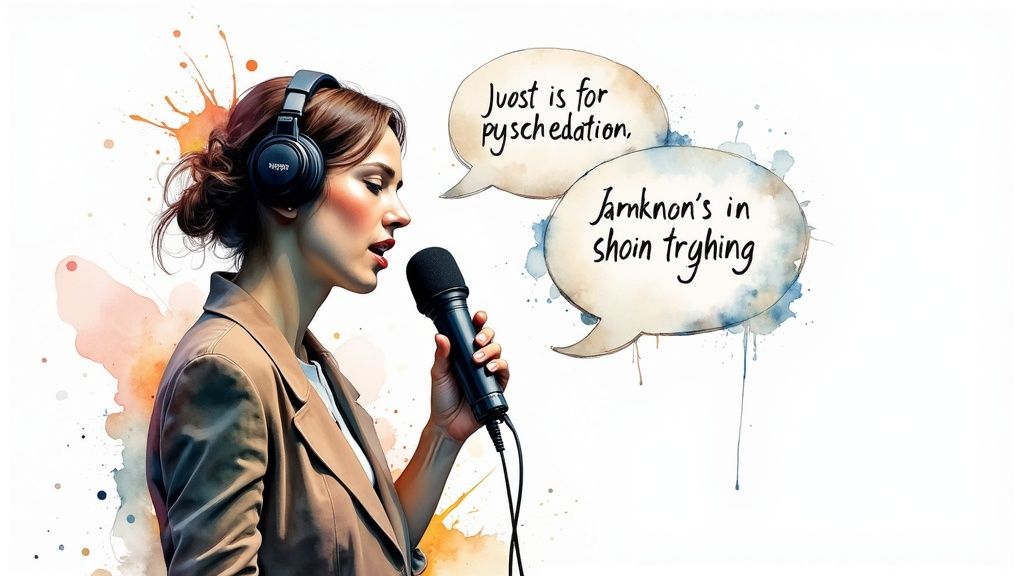Introduction

In the bustling world of podcasts, getting noticed is more important than ever. With so many podcasts and episodes competing for listeners, creators need effective strategies to reach their audience. Podcast transcription offers a powerful solution. It's not simply about creating a written version of your audio; it's about unlocking a range of benefits that can significantly boost your podcast's success. This introduction will explore the importance and advantages of using effective podcast transcription tools.
One key advantage is increased accessibility. By offering a text version of your audio, you make your podcast available to a wider audience, including people with hearing difficulties and those who simply prefer reading. For instance, a commuter on a crowded train might choose to read a transcript instead of listening. Transcripts also allow listeners to easily follow along with complex topics, quickly revisit key sections, and share quotes, spreading your message further. This greater accessibility leads to more engaged listeners and a more inclusive podcast experience.
Beyond accessibility, transcription plays a vital role in Search Engine Optimization (SEO). Search engines can't analyze audio content, but they can index text. By providing transcripts, you give search engines the information they need to understand your podcast's topics and keywords. As a result, your episodes become searchable online, increasing your visibility and attracting organic traffic to your website. Effective SEO is essential for finding new listeners and growing your podcast's audience.
Furthermore, transcripts provide valuable opportunities for repurposing your content. The transcribed text can be used to create blog posts, social media updates, and other marketing materials. One podcast episode can generate multiple pieces of content, extending your reach and saving you time and effort. These repurposing possibilities make transcription a valuable tool for content marketing and audience growth. Let's now explore the variety of tools available for podcast transcription.
Top Automated Transcription Services

As we've seen, using effective podcast transcription tools is essential for growing your audience and visibility. This means finding the right tools to accurately and efficiently convert your audio into text. The market offers numerous automated transcription services powered by AI, with diverse features and pricing. Choosing the best tool depends on your specific requirements, budget, and desired level of accuracy. Let's examine some of the top automated transcription services available.
Leading AI-Powered Transcription Tools
A popular choice for many podcasters is Ausha. Its AI-powered transcription is impressively fast, converting a 30-minute episode into text in minutes with high accuracy. This speed and accuracy help maintain a regular publishing schedule and provide readily available transcripts. Ausha also seamlessly integrates with its own platform, making transcription and embedding transcripts into web pages and RSS feeds incredibly simple.
Another strong option is Sonix, which offers a complete set of features. Known for its quick turnaround and powerful editing tools, Sonix allows for collaborative editing, making it ideal for teams. For example, multiple team members can work on the same transcript concurrently, ensuring quality and efficiency. Sonix also provides various export options, giving you flexibility in how you utilize your transcripts.
However, it’s important to understand the specifics of each platform. While Happyscribe offers a user-friendly interface and collaborative features, it may not integrate as seamlessly as Ausha. Similarly, while Trint has advanced features and collaboration tools, it might not automatically update podcast websites and RSS feeds, requiring manual updates.
Key Features to Consider
When choosing a transcription tool, several key features are important. Accuracy is paramount. While AI has advanced significantly, some tools are more accurate than others, especially with complex audio involving multiple speakers or technical terms. Look for services with high accuracy rates and consider whether they offer speaker identification. This feature significantly improves the readability of your transcripts.
Speed is another important factor. Tight deadlines necessitate a tool with fast turnaround times. Some services offer near real-time transcription, while others may take several hours. Choose a service that fits your workflow. Finally, consider the tool's integration capabilities. Smooth integration with your podcast host or other marketing tools streamlines your workflow and saves time.
Choosing the right solution for your podcast is crucial. Making the right choice maximizes the benefits of transcription, improving accessibility, SEO, and reach. Now, let's explore human-based transcription services, an alternative approach to generating high-quality transcripts.
Human-Based Transcription Services
While automated transcription offers speed and convenience, some podcasters prefer the accuracy and nuance of human transcription. This is especially true for podcasts with complex audio, technical jargon, or multiple speakers. A robot vacuum can clean effectively, but sometimes you need the detail-oriented approach of a human for those hard-to-reach spots. Similarly, human transcribers offer a level of understanding and attention to detail that AI sometimes misses. This makes human transcription an important consideration.
Advantages of Human Transcription
Human transcribers excel at understanding challenging audio. They can interpret subtle nuances in speech, accurately identify different speakers, and understand context, ensuring the final transcript is accurate and reflects the intended meaning. For example, a human transcriber can differentiate between homophones based on context, minimizing errors. They can also accurately transcribe technical terms, industry jargon, and even slang, which can be difficult for AI.
Human transcribers can often provide more accurate transcripts than automated services, especially with audio containing accents, background noise, or overlapping speech. This is because they apply their language, grammar, and context knowledge to interpret the spoken words. This level of accuracy is crucial for legal, academic, or other situations demanding precision.
Selecting a Human Transcription Service
Just as with automated tools, choosing the right human-based service is essential. Consider factors like turnaround time, pricing, and expertise. Some services specialize in specific industries, like medical or legal transcription, while others focus on general transcription. Choosing a service with relevant experience ensures accurate and specialized transcripts. Also, look for services offering quality assurance measures, such as proofreading and editing, to guarantee the highest accuracy.
Several reputable companies offer human transcription services. Rev, for example, is known for its speed and accuracy. Scribie offers different service levels based on budget and accuracy requirements. GoTranscript is another option known for its competitive pricing and specialization in various industries. Many services also offer additional features like timestamping, speaker identification, and verbatim transcription, valuable for specific podcasting needs. Carefully consider these options to find the service that best fits your needs. This ensures you access tools that perfectly match your podcasting requirements. Next, we'll explore hybrid transcription solutions, combining the speed of AI with the accuracy of human review.
Hybrid Transcription Solutions

Having discussed automated and human transcription, we now turn to a compelling alternative: hybrid transcription. These services combine the speed of AI-powered transcription with the accuracy of human review. This blended approach offers podcasters the best of both worlds – fast turnaround and high accuracy. It's like having a skilled editor refining the work of a fast writer. This ensures quick and meticulously refined transcripts.
The Power of the Hybrid Approach
Hybrid transcription uses AI to create a first draft, significantly reducing time and cost compared to solely human transcription. Then, a human transcriber reviews and edits the AI-generated draft, correcting errors, ensuring proper formatting, and adding elements like speaker identification and timestamps. For example, the human editor can interpret nuances like tone of voice and meaning, ensuring accuracy. This combination of automated efficiency and human oversight delivers accurate transcripts without the high cost of purely human-based services, making hybrid transcription an excellent option for podcasters seeking quality and affordability.
Choosing the Right Hybrid Service
When considering hybrid services, look for transparent workflows and clear pricing. Some providers charge per audio minute, while others offer tiered pricing based on turnaround times or features. For instance, some services offer rush options, while others might include speaker diarization or verbatim transcription for an extra fee. Also, understand the level of human review. Some services offer a light touch, correcting obvious errors, while others conduct a more thorough review, ensuring accuracy and readability. Choosing the right level of human involvement depends on your podcast’s needs and budget.
Several services employ this hybrid model, including Descript, Trint, and Otter.ai. Descript offers a robust platform for audio and video editing with integrated transcription using AI and human review. Trint is known for its speed and accuracy in transcribing audio and video, using a hybrid approach to deliver high-quality transcripts quickly. Otter.ai provides AI-powered transcription with the option of adding human review for greater accuracy. This is especially helpful for podcasts with complex audio or multiple speakers. Each service offers a unique combination of features and pricing, so compare carefully to find the best fit for your needs. This exploration of hybrid solutions demonstrates the range of choices available, leading us to a discussion about cost comparison.
Cost Comparison
Understanding the pricing structures of different transcription options is essential for making informed decisions and managing your podcast's budget. The cost can vary significantly depending on the type of service – automated, human, or hybrid – and the specific features offered. Let’s break down the typical pricing models for each category.
Automated Transcription Services: Pricing and Considerations
Automated services are generally the most affordable, typically charging per audio minute, with prices ranging from a few cents to around $0.25 per minute. A one-hour podcast episode might cost between $1.50 and $15.00, depending on the provider and plan. Some providers offer monthly or annual subscriptions with a set number of transcription minutes, cost-effective for podcasters who regularly release content. However, remember that while automated transcription is budget-friendly, the accuracy might require editing, especially for complex audio. Factor this editing time into your overall cost assessment.
Human Transcription Services: Investing in Accuracy
Human transcription, offering the highest accuracy, comes at a higher price. These services usually charge per audio minute, with rates typically ranging from $0.75 to $2.00 or more per minute. A one-hour episode could cost between $45 and $120 or more. The higher cost reflects the expertise and detail involved in human transcription, ensuring a precise transcript. Some services offer tiered pricing based on turnaround time, with rush orders potentially incurring additional fees. Consider these factors when making your selection.
Hybrid Transcription Solutions: Balancing Cost and Quality
Hybrid solutions offer a middle ground in terms of cost. They use AI to create a first draft, then reviewed by a human transcriber. This combines automated speed and affordability with human accuracy. Pricing typically falls between automated and human rates, often ranging from $0.30 to $1.00 per minute. Transcribing a one-hour episode could cost between $18 and $60. Some services offer tiered pricing based on the level of human review. A more thorough review will likely cost more but will produce a higher-quality transcript. This balance makes hybrid transcription an attractive option.
Conclusion

Choosing the right transcription service is vital for podcasters looking to expand their audience and improve their content. This means carefully evaluating automated, human, and hybrid solutions. Automated transcription, using tools like Ausha and Sonix, offers speed and affordability. However, accuracy can be an issue, especially with complex audio, often requiring manual editing.
Final Recommendations for Choosing Top Podcast Transcription Services Tools
Human transcription offers superior accuracy but at a higher cost. This is comparable to hiring a professional editor versus using an automated grammar checker. While both are useful, the precision levels differ. For podcasters prioritizing accuracy, especially those with technical vocabulary or multiple speakers, human transcription is the best option. However, budget constraints may make this impractical.
Hybrid services balance cost and accuracy by using AI for the initial transcription and a human editor for refinement. This combines the speed of automated tools with human understanding, offering a good balance of accuracy and affordability. The best tool depends on your individual needs and priorities.
Key Selection Criteria for Podcast Transcription
-
Accuracy: How important is verbatim transcription? Will minor errors affect understanding?
-
Turnaround Time: Do you need transcripts quickly, or do you have more flexibility?
-
Budget: How much can you invest in transcription? Does the value align with the cost?
-
Integration: Does the service integrate with your podcast hosting platform or other tools? This simplifies your workflow.
Finding the right balance is key to maximizing the benefits of transcription. By making informed decisions, you can improve accessibility, boost SEO, and grow your audience.
Ready to enhance your podcast and use AI in your content strategy? Check out Next Craft for premium AI-enhanced marketing services and learn how to implement these solutions for optimal results. Visit Next Craft today!